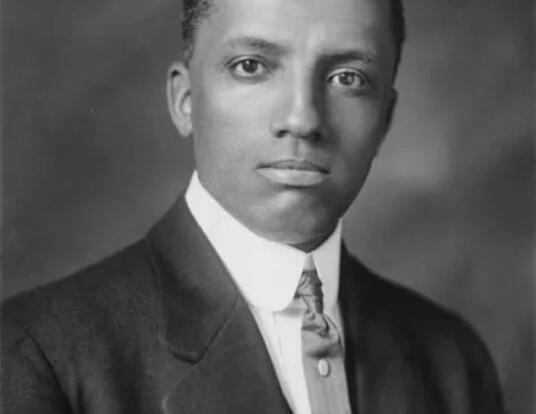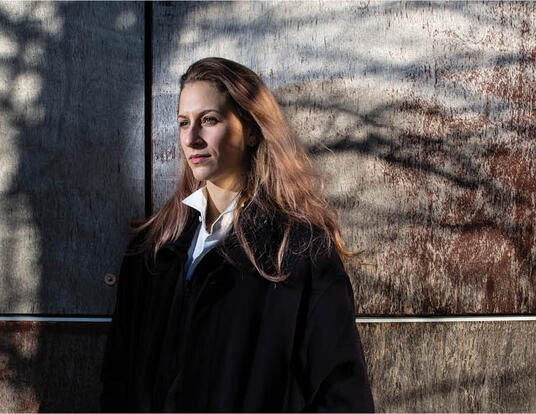Du Yun: 2023 Centennial Medal Citation
Du Yun is a creator of music that challenges and transcends—genres, expectations, preconceptions, limits of any kind. Both composer and performer, musician and visual artist, she is as fluent in the vocabulary of opera and orchestral music as she is in that of theater, cabaret, oral tradition, electronics, and noise—and she brings it all to bear in visceral, collaborative, irrepressible work that has garnered the very highest global acclaim.
Born and raised in Shanghai, China, Du Yun began studying piano when she was four years old and enrolled in the Shanghai Conservatory at the age of six. She moved to the United States in 1997 to continue her studies, graduated from the Oberlin Conservatory of Music in 2001, and completed her master’s in 2005 and PhD in 2006 in music at Harvard. Now based in New York City, Du Yun is a professor of composition at the Peabody Institute at Johns Hopkins and a distinguished visiting professor at the Shanghai Conservatory of Music. She leads the band Ok Miss, equal parts rock group and chamber ensemble, and she has been a featured composer at the Los Angeles Philharmonic, New York Philharmonic, Carnegie Hall, Lincoln Center, and scores of distinguished venues and museums around the world.
Du Yun does not shy away from telling difficult stories, and she centers marginalized perspectives in her work. She became the first Asian woman to receive the Pulitzer Prize for Music in 2017 for her opera Angel’s Bone, a searing parable of human trafficking that incorporates a range of genres and styles. Her 2020 opera Sweet Land, a collaborative, immersive production staged at Los Angeles State Historic Park, examines the painful reverberations of colonization in the United States and was named best new opera by the North America Critics Award Association. Four of her recent albums have appeared on “Notable Recordings of the Year” lists by The New Yorker, which has praised her “relentless originality and unflinching social conscience.” Du Yun has been named a Guggenheim Fellow, was nominated for a 2019 Grammy Award for best classical composition, and is the youngest person in Harvard’s history to receive a Centennial Medal.
Joshua Fineberg, professor of composition and director of the Center for New Music at Boston University, was one of Du Yun’s principal composition teachers at Harvard. “Du Yun had an exceptional sense of self as an artist,” Fineberg recalls. “She’s deeply collaborative, and she’s effective at being both a performer and a composer; this is a shift that has been happening in the field, and Du Yun is at the forefront of it.” Fineberg adds, “When you look through history at composers who have done really well, they seem like such exceptional individuals because they have just the right mix of talents and ideas for the moment and the place they’re in. And that’s what’s happened with Du Yun.”
Ken Ueno PhD ’05, professor of composition at UC Berkeley, a close friend and past collaborator, calls Du Yun “my favorite karaoke partner.” He was a few years ahead of her in their graduate program at Harvard. “It was so refreshing when Du Yun arrived,” Ueno recalls. “She has a non-hierarchical way of engaging with sounds, which I attribute to how broadly she has since been able to collaborate with musicians of different backgrounds and traditions. The press has hailed her as a cross-disciplinary artist, but I think she’s more natural than that. Her music flows, emanates, naturally from her inherently without boundaries—nothing to cross.”
Claire Chase, professor of the practice in the Department of Music, came of age as a musician with Du Yun—first when they were classmates at Oberlin, and shortly thereafter as founding members of the International Contemporary Ensemble, a leading new-music group that has premiered more than a thousand works in the past two decades. “Du Yun catapults us into the possibility of a post-genre future without losing touch with our vast musical past,” Chase notes. “On a given day, you’ll find her researching 5th-century hymns, the ban on 16th-century sarabandes in Spain, and the Shanghai punk band scene. All of this will end up in her music.”
By any measure, Du Yun contains multitudes. As Chase puts it: “Du Yun’s new work is some of the most widely performed in her generation of composers, and it is a testament to her unabashed eclecticism—her voracious musical curiosity and her boundless capacity to reinvent her practice with each new project—that the artists, ensembles, and organizations that have performed her work espouse vastly different styles and aesthetics. She refuses to fit into any niche, and she playfully but purposely foils categorization of any kind. As a composer, performance artist, curator, educator, beloved collaborator, and fiercely dedicated advocate for her fellow musicians, Du Yun is one of the defining artists of our time.”
Du Yun, for your virtuosic achievements in both composition and performance, for the breathtaking originality of your art, and for the deep sense of community and humanity that imbues your work and expands the horizons of all who encounter it, we are proud to award you the 2023 Centennial Medal.
Get the Latest Updates
Join Our Newsletter
Subscribe to Colloquy Podcast
Simplecast





